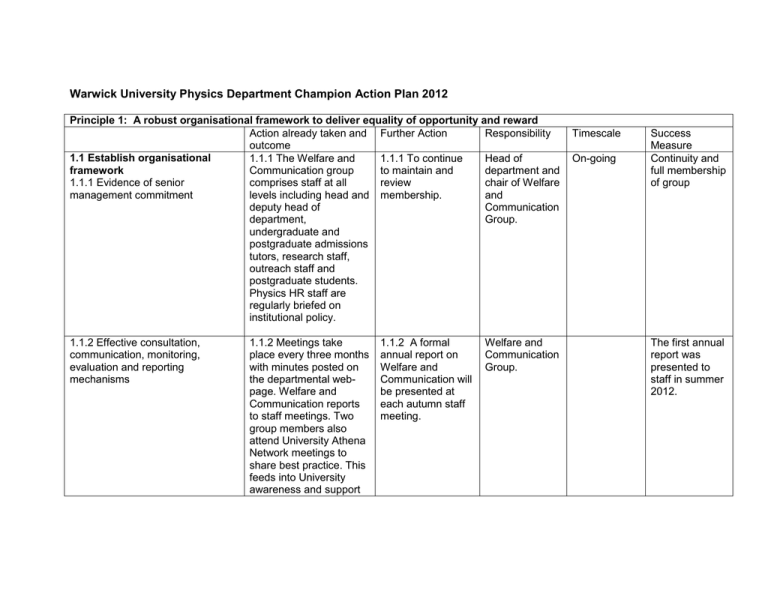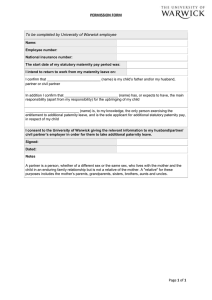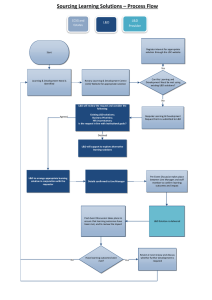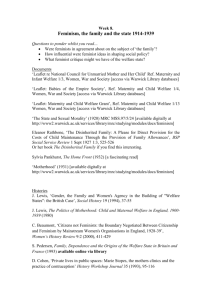Warwick University Physics Department Champion Action Plan 2012
advertisement

Warwick University Physics Department Champion Action Plan 2012 Principle 1: A robust organisational framework to deliver equality of opportunity and reward Action already taken and Further Action Responsibility outcome 1.1 Establish organisational 1.1.1 The Welfare and 1.1.1 To continue Head of framework Communication group to maintain and department and 1.1.1 Evidence of senior comprises staff at all review chair of Welfare management commitment levels including head and membership. and deputy head of Communication department, Group. undergraduate and postgraduate admissions tutors, research staff, outreach staff and postgraduate students. Physics HR staff are regularly briefed on institutional policy. 1.1.2 Effective consultation, communication, monitoring, evaluation and reporting mechanisms 1.1.2 Meetings take place every three months with minutes posted on the departmental webpage. Welfare and Communication reports to staff meetings. Two group members also attend University Athena Network meetings to share best practice. This feeds into University awareness and support 1.1.2 A formal annual report on Welfare and Communication will be presented at each autumn staff meeting. Welfare and Communication Group. Timescale On-going Success Measure Continuity and full membership of group The first annual report was presented to staff in summer 2012. networks with other STEM departments 1.1.3 Clear accountability for implementation and resources allocated (time and money) 1.1.3 Participation in Welfare and Communication meetings is recognised as part of the department collegiate structure; coordination is a recognised duty. Funds for Juno/Athena related travel are provided as required. 1.2 Monitoring and evidence base 1.2.1 Monitor over time, quantitative data by gender for staff and students 1.2.1 Data is collected by the University for all departments; this shows no. of male/female undergraduates, gender of staff appointments, promotion rates at all staff levels for male and female staff etc. This data is available from 2006/7 1.2.1 To continue to collect this information via HR systems (staff) and Management Information and Planning office (students). Welfare and Communication Group On-going The chair of Welfare and Communication group has attended a Juno workshop in Bristol, and also an Athena ‘going for gold’ workshop in London. The chair of Welfare and Communication group collects this data from the University on an annual basis 1.2.2 Obtain qualitative data from staff. 1.2.2 Qualitative data from staff is identified through the annual Pulse Survey. 1.2.2 To continue to press university HR to change PULSE questions. 1.2.3 Identify any discrepancies in gender representation and/or progression and identify factors that might be causing them 1.2.3 For 2010/11 Warwick Physics Department has a lower percentage of female students at both undergraduate and postgraduate level than the national average (17% v 22% undergrad, 20% v 23% postgrad). The undergraduate figures have remained unchanged over the past 5 years. 1.2.3 Quantitative data will be examined on an annual basis. A comparison with other departments offering straight Physics will be looked at in the future. The current national average includes departments which offer combined courses such as Physics with Welfare and Communication Group Data from the Pulse survey is available online for years 2010 and 2011. Physics has a more positive response to ‘working environment and work-life balance’ (68%) than the University average (63%) and the science faculty average (59%) Warwick Physics Department has a higher proportion of female staff than the national average (19% v 16%), and a higher proportion of female professors (11% v 6%) Medical Physics which have a higher female intake. Principle 2: Appointment and selection processes and procedures that encourage men and women to apply for academic posts at all levels Action already taken and Further Action Responsibility Timescale Success outcome Measure 2.1 Ensure that processes and 2.1.1 Appointments are HR On-going Thirty four procedures are fully inclusive monitored by the Learning administrator research 2.1.1 Ensure career breaks are and Development Centre and taken into consideration (LDC). Warwick’s academic recruitment and selection staff have policies are gender blind; joined the all advertisements have a Department Diversity statement. since the last submission, 7 of whom are women and 27 men 2.1.2 Gender awareness 2.1.2 Senior management 2.1.2 Staff will be Head of Before next All senior included in training for all staff and cluster heads have encouraged to do online Department academic staff have who interview undergone online training gender awareness training year undertaken supplied by LDC supplied by LDC. recruitment Gender awareness will be training. http://www2.warwick.ac.uk/ services/ldc/development/re recommended for inclusion as part of pCap course. cruitelearn/ 2.1.3 Provide induction for all new staff, including research assistants, on appointment 2.1.3 Induction packs are given to all new staff; these are tailored according to staff category. Post graduates at Warwick who become a PDRA also receive a ‘top-up’ induction. 2.1.3 Induction packs are updated continuously HR administrator On-going Induction packs have been given to all staff for many years. 2.2 Take positive action to encourage under-represented groups to apply for jobs 2.2.1 Monitor applications, shortlists and appointments, looking at the proportion of women (internal and external) at each stage 2.2.1 Staff appointments for all departments are monitored by the University and these statistics are made readily available. Current data goes back to 2006-7. 2.2.2 Identify any discrepancies and investigate why this might be the case, taking action as necessary 2.2.2 Recruitment figures show that for the period 2009-2011 the percentage of women who were successful in academic and research appointments varied between 0 and 11.76%, whilst the percentage of men who were successful varied between 0 and 11.11%. Welfare and Communication Group 2.2.2 The Welfare and Communication Group will monitor the proportion of women and identify discrepancies on an annual basis. The Welfare and Communication Group will advise Head of Department 12 months. The chair of Welfare and Communica tion group collects this data from the University on an annual basis. Two women and six men have been recruited at assistant professorial level or above since the last submission. Principle 3: Departmental structures and systems which support and encourage the career progression and promotion of all staff and enable men and women to progress and continue in their careers Action already taken and Further Action Responsibility Timescale Success outcome Measure 3.1 Transparent appraisal and 3.1.1 Staff appraisal occurs Head of On-going Annual development through the Staff Annual Department, reviews 3.1.1 Appraise all staff, Review Process. PDRAs line managers, have been including researchers and have six monthly review HR held since PDRAs meetings with their line November manager but are also given 2008. All 78 the option to have an permanent Annual Review. They also members of have a consultation with the staff were head of department six and offered four months before their Annual contract ends, and an exit Review. interview This was taken up by 66 people. 3.1.2 Mentoring scheme in 3.1.2 All academic staff on place with training and guidance probation have a mentor for available for both mentors and up to five years. The mentees university provides training for those who wish to become mentors. Mentors are available for staff returning from maternity/paternity/adoption leave. 3.1.3 Ensure all staff, including 3.1.3 Career guidance is PDRAs, have access to impartial available through LDC for career guidance all staff categories. LDC actively market their events; researchers receive a dedicated monthly enewsletter detailing events. The annual review process also fosters career development 3.2 Transparent promotion 3.2.1 A senior female processes and procedures academic is included in the 3.2.1 Ensure promotions promotions committee. process is transparent and fair to all staff at all levels, including those who have had a career break 3.1.3 To continue to liaise with LDC to identify appropriate courses for all categories of staff 3.2.2 Ensure all staff are aware of promotion criteria and process and the support available to them throughout the process. 3.2.2 This has been rolled out to research staff for 2012. 3.2.2 All academic staff are aware of the process through the departmental web pages, and annual emails inviting submission for promotion. HR Promotions committee. HR. Promotion data show that for Physics, 3 women and 25 men were put forward for promotion since the last submission. Continual review. 3.2.3 Take steps to identify and encourage potential candidates for promotion 3.2.3 Potential candidates are identified and encouraged through the annual review process. Each case is discussed and iterated with line manager and cluster head. The promotion committee offers advice on a draft before submission to the University. 3.2.3. The statistical data on promotions will be reviewed. Promotions committee August 2012 For 2012, all staff entitled to be promoted were given the opportunity to apply. Principle 4: Departmental organisation, structure, management arrangements and culture that are open, inclusive and transparent and encourage the participation of all staff Action already taken and Further Action Responsibility Timescale Success outcome Measure 4.1 Promote an inclusive 4.1.1 Staff meetings are 4.1.1 Meetings will be Secretary for Informed and culture now open to all categories monitored to ensure a minutes engaged staff. 4.1.1 Ensure departmental of staff; these are held three good mix of staff continue Policies and processes, procedures and times per year. Staff from all to attend. practices are practices are fully inclusive categories do attend. included in the annual report to staff. 4.1.2 Gender awareness 4.1.2 Senior management 4.1.2 Staff will be Head of Before next All senior staff included in the training for all and cluster heads have encouraged to do online Department and academic have staff and demonstrators. undergone online training gender awareness training all lead staff year undertaken supplied by LDC supplied by LDC. This diversity training. http://www2.warwick.ac.uk/ covers all protected services/ldc/development/di characteristics. versityelearn/ Face to face training is available from the University equality and diversity team. 4.1.3 Promote inclusive social activities and other opportunities for mutual support and interaction. 4.1.3 Academic away days are usually organised for ‘clusters’ rather than the whole Department. Social activities for the whole Department include a summer barbeque for all staff, and a Christmas meal for all staff plus partners. Coffee is served in the common room every day at 11am to act as a social centre for the Department. A weekly newsletter continues to be emailed to all staff 4.1.4 Use positive, inclusive images in both internal and external communications. 4.1.4. Positive and inclusive images are used in departmental literature for potential undergraduates. The Physics website includes links to staff profiles showing positive role models. 4.1.3 A monthly network for new research staff with support from the LDC will be trialled for one year, to act as support and boost networking between departments; this will be publicised in Physics through the dedicated research staff email list and in the weekly newsletter. Head of Department and all lead staff 12 months There is a high level of attendance at both Christmas and summer events. Since the last submission, a webpage has been created with the staff profiles of nine women working in Physics. A new display showing our Juno and Athena Swan status is on show at open days. 4.1.5 Encourage and support female seminar speakers. 4.1.5 The number of female speakers in the Department is monitored. For 2011, 17% of the speakers at seminars in the Physics Department were female (19 out of 108). 4.2 Transparent workallocation model 4.2.1 Recognise the full range of types of contributions and departmental role, including administration, welfare and outreach activities. 4.2.1 The work allocation model is conducted by the Director of Studies, taking into account teaching and administrative duties. The Department has a dedicated outreach officer, 80% of full time, funded by the Ogden Trust. Director of Studies. 4.2.2 Ensure all staff are aware of the criteria used to develop the model and that the allocation is transparent 4.2.2 Details of the algorithm are available on the teaching pages of the departmental web-site and also in academic induction material. Allocation of duties are discussed with individual staff in the three month period prior to annual publication. All staff are offered a chance to change their balance of work within a predetermined fixed load each year; administrative Director of Studies. ~50% of staff take the opportunity to discuss their duties each year duties rotate every three years. The workload allocation process has been discussed at a previous academic away day. Principle 5: Flexible approaches and provisions that enable individuals, at all career and life stages, to optimise their contribution to their department, institution and SET Action already taken and Further Action Responsibility Timescale Success outcome Measure 5.1 Support and promote 5.1.1 The Department at Head of On-going. Twelve men flexible working practices Warwick has supported Department and and four 5.1.1 Clear support from Head flexible and part time HR women staff of Department for flexible and working for all staff for a administrator. members part-time working number of years. Parental currently work leave, where staff may take part-time in up to four weeks unpaid the leave in any year for each Department. child under 5, is promoted through the university website and also through the annual report to staff. 5.1.2 Consistently applied policy on part-time and flexible working 5.1.2 Due to small numbers, each case is considered individually. 5.1.3 Promote the benefits of flexible working for both men and women, particularly for those with caring responsibilities 5.1.3 Staff profiles including those with flexible/part-time working patterns are readily available on the departmental website 5.1.4 Explicit support for those returning from career breaks or maternity leave 5.1.4 Staff returning from maternity leave can seek study leave for the term following maternity leave in order to gain research momentum. The University also offers a salary sacrifice scheme for staff using the University nursery. The nursery was rated excellent by OFSTED in 2010/2011, and has also won an architectural award. Ten KIT (keep in touch) days are available for women on maternity leave to spend time in the Department 5.1.4 From March 2012 there has been a new ‘Returning parents’ support network’ organised through the University Equality and Diversity team. Awareness of meeting dates is raised through the weekly departmental newsletter. One member of academic staff has taken, and returned from, maternity leave since the original submission. She is currently on study leave. One postgraduate student has taken maternity leave, and the Department successfully applied for a grant from the graduate hardship fund to cover her funding during this time. One 5.1.5 Encourage take up of paternity and other caring leave 5.1.5 Additional paternity leave can be taken if maternity leave is not fully taken up. Paternity, adoption and parental leave are promoted in the induction booklet, and also online. clerical member of staff has returned from maternity leave on condensed hours. 2 or 3 members of Physics academic staff take paternity leave each year.


